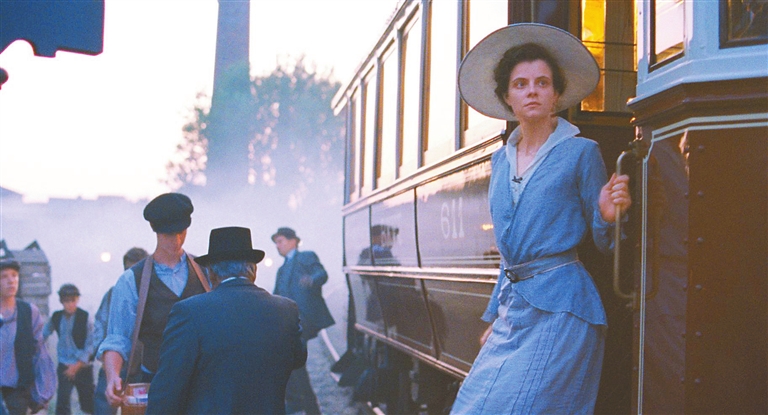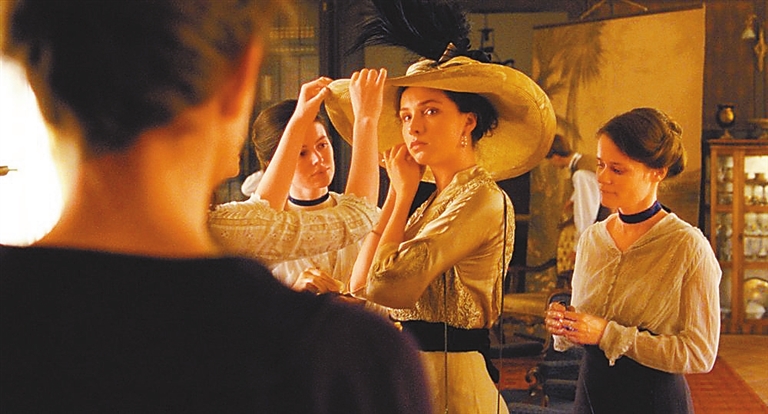

Starring: Juli Jakab, Vlad Ivanov, Evelin Dobos, Marcin Czarnik, Judit Bárdos, Benjamin Dino, Balázs Czukor Director: László Nemes CAN a film be baffling and rewarding at the same time? Can a stimulating cinematic experience coexist with the suspicion that the filmmaker has deliberately set out to frustrate the audience? For all who believe the answer to those questions can be “yes,” then “Sunset” (Napszállta), the second film by “Son of Saul” director László Nemes, provides a rich seam to explore. It helps that the story of a stubborn young woman’s search for her lost brother in 1913 Budapest is strangely gripping for much of its length, even as the search turns in on itself and evaporates. Two hours and 20 minutes of Austro-Hungarian obfuscation is not everyone’s cup of tea. But some viewers will undoubtedly be intrigued by the idea of David Lynch’s “Mullholland Drive” meeting Joseph Roth’s novel “Radetzky March” in some Kafkaesque netherworld. The breathless subjective camera of “Son of Saul,” hovering close to the face of the main character, or following close behind, is carried over wholesale into “Sunset.” There is hardly a shot in which Juli Jakab’s character Irisz is not present in some form as she sets out on a quest to find a brother she was not at first aware she had. Only in the very first shot, as she tries on a succession of elaborate hats, is her face at repose, lost in a dream. From then on, once she reveals to the shopgirl that she is not a customer but is looking for a job at what is clearly Budapest’s top milliner’s, her expression changes: setting her jaw, Irisz becomes driven, stubborn, haunted. The score underlines this mood with a succession of somber held chords, leavened only occasionally, with a sense of dark irony, by classical music from the era by Schubert, Lehrer and other composers. Meanwhile, shouts, rumbles and whispers emerge from the background into fragments of dialogue. Irisz is a Leiter, and she’s a problem for smooth, guarded hat shop owner Oszkár Brill (Romanian actor Vlad Ivanov, good). His establishment is also called “Leiter” — and trained milliner Irisz is, she reveals, the daughter of its founders, who died in a fire when she was 2 years old. If Brill is keen to put Irisz back on the train to Trieste as soon as possible, it may also have something to do with the brother Irisz has just discovered she has — who killed a Hungarian count five years earlier and disappeared. We’re less than a quarter of the way in by the time all this has been revealed. What comes next is near-impossible to summarise. Like “Saul,” the protagonist of Nemes’ Oscar-winning debut, Irisz is in a state of near perpetual motion, moving between the hat shop, where she has been reluctantly taken on by Brill and steely manageress Zelma (Evelin Dobos), the bustling city streets, and a countryside where great estates and rough villages violently intermingle. “Sunset” begins to crumble, to offer itself up to scorn and absurdity, once we start asking questions like “Doesn’t Irisz have regular work hours?” or “How come she always manages to get a lift in a coach just when she needs one?” This was not a danger in the director’s last, where Saul’s ability to access all areas was in the nature of his job and the careful staging of the action tracked by the roving camera eye was based on meticulous research. Does this make “Sunset” a lesser film? Yes, probably: the subjective camera, in particular, risks making the director seem repetitive. But it’s also a film dripping with brooding atmosphere that fashions drama out of locations as much as plot or character. The hat shop in particular is a proud symbol of established haute-bourgeois imperial-commercial prosperity, but it has a sealed-off room where the Empress Sissi once lost a hatpin, and owner Brill may or may not be pimping out its comely assistants. The movie will be screened in Shenzhen starting Tuesday. (SD-Agencies) | 
